Health Benefits of Monkey Kola You Should Know
Health benefits of monkey kola are many, but first, let me start with how I got to know about the monkey kola tree.
A few days ago, a colleague of mine came to work with Monkey Kola. It was the crunchy sound that drew my attention to her. On a closer look, I discovered that I have not noticed or eaten this fruit before.
When I asked her what she is eating, she told me it is called Monkey Kola. I always get excited when I discover new fruits and as a tradition, I decided to research, write about it and share with you, my lovely readers
Below are some of the queries from Google, so sit back and relax as the answers unfold:
- Monkey kola Video
- The monkey kola fruit
- Health benefits of monkey kola
- Monkey kola and pregnancy
- Pictures of monkey kola
- Monkey kola in Hausa
- Health benefits of red monkey kola
- Monkey kola Wikipedia
- How to use monkey kola
- Monkey kola tree
- Red monkey kola
- Monkey kola as aphrodisiac
- The Monkey kolangal
- Monkey kola seed
- How to eat monkey kola
- Monkey kola image
- Can a pregnant woman eat monkey kola?
- Monkey kola nuts
Table of Contents
What is Monkey Kola? Please watch the video for a better understanding
It is a name given to some edible wild relatives of West African kola nut. The scientific name includes Cola lateritia K. Schum, C. lepidota, and C. pachycarpa K. Schum.
These are underused indigenous tropical fruit species that grow in the humid West and Central African forests.
Monkey kola is the English name given to some unique cola underused indigenous tropical fruit species.
These are underused indigenous tropical fruit species that grow in the humid West and Central African forests.
Please Read: 20 Overwhelmingly Benefits of Custard Apple (Sugar Apple)
The English name of monkey kola in Yoruba is obi edun. It is also referred to as Ochicha, Achicha, Utu, or Ochiricha in Igbo while Efik/Ibibio’s call it Ndiyah. Also, in Ikwerre language in River State monkey kola is called Oyiya
It is a healthy fruit and a tasty perennial plant that can be seen in homes and villages.
In Nigeria, the fruit pulp is eaten by humans and a few wild animals like monkeys, baboons, and other primates.
This African fruit with all its nutritional benefits is not well known so it requires more publicity and attention so that people will be aware of the fruit and its amazing health value.
5 Key Facts About Monkey Kola Health Benefits
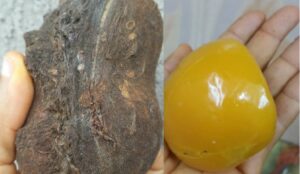
- Firstly, Monkey kola has edible flesh that can be yellow, red, or white. The yellow variety of Monkey kola called cola is the most common and has surplus nutritional, and medicinal value than the red and white monkey kola.
- Secondly, its white pulp is called cola lepidota, while the Monkey kola with red pulp is called cola lateritia and is the least common.
- Thirdly, Monkey kola fruit is crunchy just like a carrot. The fruits are available from around June to November and are very nutritious. They are a great source of fiber, vitamins, and minerals.
- They also contain calcium, phosphorus, iron, sodium zinc, and potassium.
- Lastly, Monkey kola leaves are medicinal and can be used for the treatment of eye infections. Although a scarce snack, monkey kola is filling and delicious.
How to Eat Monkey Kola
- Firstly, wash the rough lizard skin-like texture of yellow monkey kola fruit.
- Then, cut in half and remove the seed.
- After that, take a bite of the fruit; it makes the crispest sound like a fresh apple. It makes a loud crunch.
- Finally. It’s now time to enjoy!
Health Benefits of Yellow Monkey Kola
- Firstly, it helps in Body Metabolism.
- Secondly, it moderates Body Cholesterol.
- Thirdly, it maintains a Healthy Gastrointestinal Tract.
- Then, it helps in Weight Management.
- It also boosts Skin and Eye Health.
- Above all, it maintains Healthy Bones and Improves Heart Health.
Red Monkey Kola
Red Monkey kola, with the Botanical name: Cola millenii K. Schum is one of several varieties across West Africa.
It grows in a flower-like pattern (funny enough, it looks like breast ducts when stripped of fat). Each segment houses white seeds that you can lick.
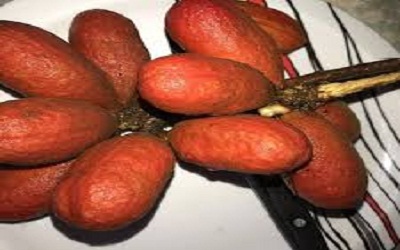
Benefits of Red Monkey Kola
The monkey kola leaf occasionally serves as food and the plant (the part not specified) is used to treat icter and many shin diseases. Also, wood is used for carpentry.
Side Effects of Monkey Kola
Monkey kola is quite nutritious in value and is wise to be taken in moderation for health improvement.
Monkey Kola and Pregnancy
Pregnancy and breastfeeding: no research yet. I will update with time-be on the watch out!
About Health Benefits and Nutritional Value of Yellow Monkey Kola
- Maintains Healthy Gastrointestinal Tract
- Helps in Weight Management
- Boosts Skin Health
- Improves Heart Health
- Maintains Healthy Bones
- Improves Eye Health
- Helps in Body Metabolism
- Moderates Body Cholesterol
What is the nutritional value of monkey kola?
Iron, zinc, and copper, as well as B-vitamins and vitamin C, were abundant in monkey kola.
The phytochemical concentration was quite high, with flavonoids (415-494mg/100g) being the most prevalent.
Monkey kola is a fruit that should be used to its maximum capacity in terms of health advantages.
Is the seed of monkey kola edible? Is monkey kola seed edible?
The plant is native to tropical Africa, with its greatest diversity found in West Africa.
The fruits are a favorite cuisine of the indigenous peoples of southern Nigeria and the Cameron. Unlike the seeds of the kola nut, the seeds of the monkey cola species are not edible (C. nitida)
What is a monkey kola?
Monkey kola refers to several edible wild relatives of the West African kolanut, such as Cola lateritia. C. pachycarpa K. Schum, C. lepidota K. Schum, and C. lepidota K
What is the definition of a monkey fruit? What is a monkey fruit?
Monkey fruit is a popular name for a variety of plants, including species from the following genera: Artocarpus. Limonia. Garcinia. Myrianthus.
What is Obi Edun in English?
Obi-Edun is a Yoruba word that means “attached Kolanut”: Kolanut and Edun – Obi – teamed up.
Is monkey fruit dangerous to eat? Is monkey fruit poisonous?
Monkey orange fruit is buried in the sand near homesteads to allow the pulp to liquefy.
The ripe fruit can be eaten raw or sun-dried to make fruit rolls, jam, juices, or wines. Although the fruit is high in vitamin C and B vitamins, the seeds of the monkey orange are deadly.
How do you eat monkey fruit?
The ripe, tough-skinned fruit is squished between the fingers when eaten. The seeds should not be eaten, and white globs on the skin should be avoided. The flesh is sticky, and it coats the insides of the mouth.
What is monkey kola Hausa?
Monkey kola is the name given to a number of distinct Cola species native to West and Central Africa.
In Igbo, it’s called Ochicha, in Yoruba, Obi edun, and in Hausa, Goron birri, and in Efik/Ibibio, it’s called Ndiyah in Efik/Ibibio.
Is monkey kola an aphrodisiac?
Kola did not have aphrodisiac action as reported, which may explain why the seeds are mostly used by the elderly.
History of Monkey kola
Monkey kola is a common name for a group of Cola spp. relatives that yield edible, pleasant fruits. The inhabitants of southern Nigeria are native to this species.
Do you enjoy reading my article on the Health Benefits of Monkey Kola You Should Know?
What local name do you call monkey kola? I will personally love to know the name of monkey kola in Hausa.
Inbox me below if you know the answer.
Above all, kindly click the share buttons, and don’t forget to rate the article and leave a comment below!
I take pleasure in reading from you. Please follow me on my social media, so you never miss a post!
Facebook| Twitter | YouTube | Pinterest | Instagram
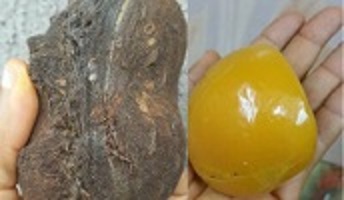
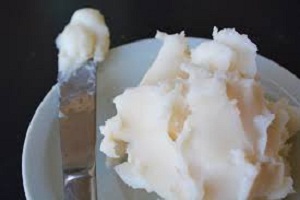
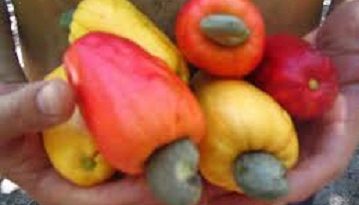
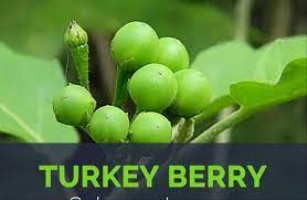
What’s up it’s me, I am also visiting this website regularly, this web page is genuinely pleasant and the users are actually sharing good thoughts.|
Thanks for a marvelous posting! I truly enjoyed reading it, you might be a great author.I will make certain to bookmark your blog and may come back someday. I want to encourage you to ultimately continue your great writing, have a nice morning!|
Hello, all the time i used to check web site posts here early in the morning, for the reason that i enjoy to find out more and more.|
You really make it appear really easy along with your presentation however I to find this topic to be really something that I think I might by no means understand. It seems too complicated and very extensive for me. I am having a look forward on your next post, I will attempt to get the dangle of it!|
Thanks, Barney. Will always keep you posted.
Hello
I wanted to know is the red monkey kola slippery
its the back that is slippery
Yes it is
Pingback: Pawpaw Magical Health Benefits and Side Effects - 9jafoods
Thanks for your thorough research on the yellow monkey cola,it helped alot.
In Ikwerre language in River State monkey kola is called Oyiya
Interesting! I’ve added that already. Thanks a bunch. A grateful heart.